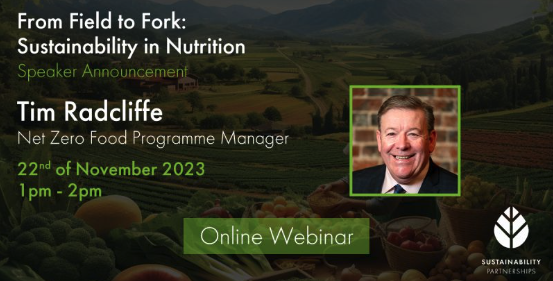From Field to Fork: Sustainability in Nutrition
In this webinar, we explored sustainable nutrition within the NHS. After a warm welcome from Georgia, the webinar unfolded with thought-provoking presentations from industry experts.
Ellie's Insightful Dive into Plant-Based Nutrition
Our journey commenced with Ellie Janes from QuornPro, shedding light on how they're revolutionizing plant-based food in the NHS. Ellie introduced the concept of microprotein through a captivating video, tracing Quorn's history and highlighting Fusarium venenatum as QuornPro's Super Protein. She emphasised the health benefits of this innovative protein while acknowledging the environmental toll of meat consumption.
Ellie passionately shared QuornPro's 'Meat Halfway' campaign, focused on helping meat eaters transition to a more sustainable diet. A standout example was the 'Meat in the Middle Cottage Pie with Root Crush,' boasting a 36% reduction in saturated fat, 46% lower C02 emissions, and a remarkable 48% increase in fibre.
Larry Rosenthal: A 50/50 Approach at Royal Free London NHS Foundation Trust
Following Ellie's insights, Larry Rosenthal from the Royal Free London NHS Foundation Trust highlighted the success of a balanced approach to food. Patients at the Trust embraced the 50/50 approach, often unable to discern the difference between traditional and plant-based meals.
Tim Radcliffe's Call for Sustainable Nutrition in Hospitals
Tim Radcliffe took the stage next, advocating for sustainable nutrition practices within the NHS. He emphasized the opportunity for hospitals to prioritize sustainability and discussed the importance of procurement choices in promoting environmentally friendly practices. Tim stressed the need for less but better meat, reduced food miles, and the significance of buying locally.
“We, hospitals, have the opportunity to put sustainability at the heart of our work.”
He delved into the low-carbon recipe bank initiative, launching in March 2024, promoting seasonal and local dishes. Tim underscored the impact of food waste, revealing that approximately 20% of the 185 million meals served to NHS patients annually end up wasted.
The webinar also unveiled NHS England's concerted efforts to reduce carbon footprints and create a low-carbon recipe bank. The emphasis was not only on environmental benefits but also on the financial advantages of sustainable practices. Trials to manage food waste have been underway, with a comprehensive document on best practices slated for release next year.
The holistic approach discussed highlighted the need to consider the environmental, social, and economic dimensions of food production and consumption in the NHS. The recurring theme was clear - you can't effectively act on what you don't measure.
Conclusions
The event concluded with a stimulating Q&A session, where our Sustainability Partnerships audience posed thought-provoking questions, further enriching the discourse on sustainability in healthcare. The webinar left participants inspired and armed with actionable insights to drive positive change in their respective fields.
As we collectively strive for a more sustainable and healthier future, the Sustainability Partnerships webinar served as a catalyst for meaningful dialogue and actionable strategies within the healthcare sector. We look forward to witnessing the tangible impact of these discussions on the journey towards a greener, healthier world.


